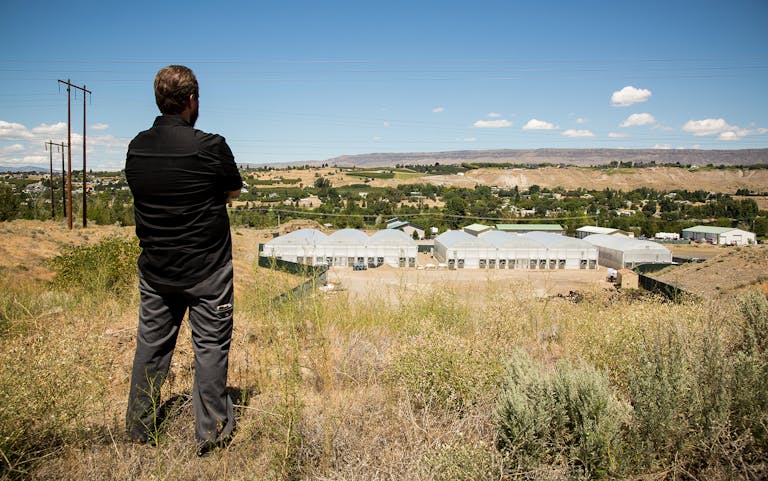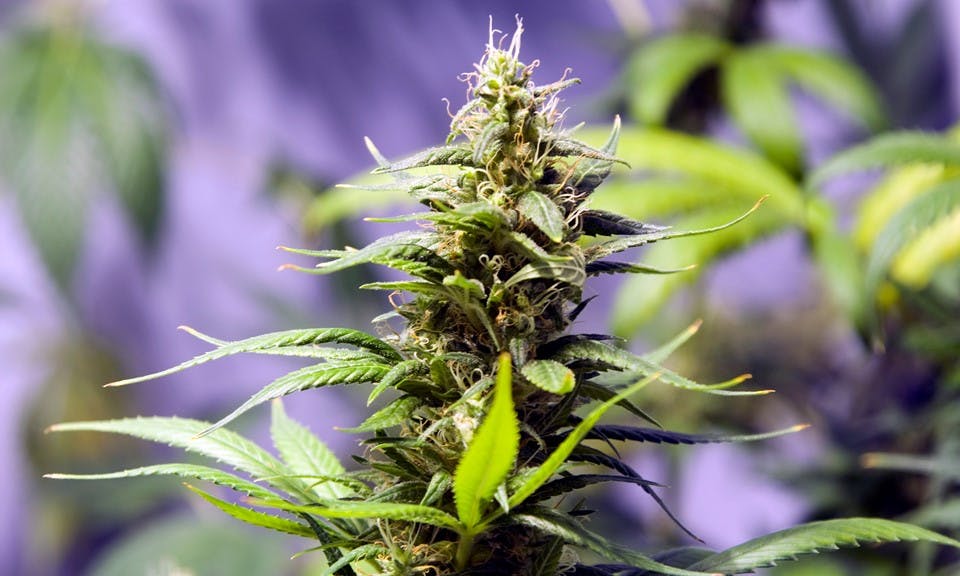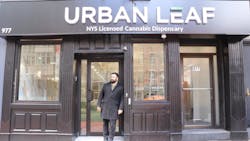When Seattle entrepreneur Roy Arms went looking for a place to grow recreational cannabis a few years ago, few spots looked as promising as the Wenatchee Valley. Straddling the banks of the Columbia River, three hours east of Seattle, the valley had everything Arms needed for his Seven Hills Farms greenhouse operation: abundant sunshine, ample irrigation water, and hydroelectric power sixty percent cheaper than Seattle’s. And Chelan County officials seemed to genuinely embrace legal weed. “Back then, they just said, ‘Look, it’s agriculture – just come in and farm,’” recalls Arms, taking a break from harvesting what he describes as a “monster crop” on his acreage a few miles from Wenatchee. “And I thought that was great.”
Arms wasn’t the only farmer feeling the love. When the state legalized cannabis four years ago, many county and city officials across north-central Washington embraced the new industry. The result was a gold rush of prospective cannabis farmers eager to tap the region’s ideal growing conditions. By early 2015, Chelan, Douglas, and Okanogan counties collectively boasted almost 100 grow operations responsible for more than a quarter of the state’s total recreational crop. With dozens of additional farming operations awaiting local approval, the future looked bright for a region some were already calling the “Napa Valley of outdoor grows”.
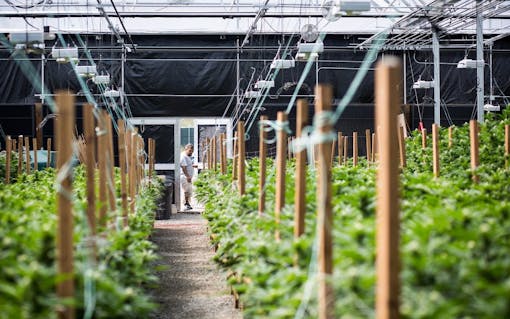
A cannabis greenhouse at Seven Hills Farms. (Jordan Stead for Leafly)
But it wasn’t all blue sky and sunshine. There had also been hints of trouble from the start. As cannabis farms began popping up on either side of the Columbia River, some residents began to complain. They disliked the ugly security fences, the glaring floodlights, and especially the strong skunkweed odor of flowering plants. At one county commission hearing, an elderly couple claimed they’d been unable to sell their home due to the smell from the farm next door. By late 2015, local sentiment had turned so sour that all three counties slapped moratoriums on new farms, effectively putting the brakes on all industry expansion. County officials began reconsidering their earlier embrace of the new industry. Today, the industry remains in the farming equivalent of a hiring freeze. Nobody’s getting shut down—yet—but no new cannabis farms are allowed in the three most fertile counties in Washington. “We’re not necessarily going to outlaw” cannabis farms, Douglas County Commissioner Steve Jenkins told a local newspaper earlier this year. “But our neighborhoods are going to be protected.”
And it would get worse. In January of this year, Chelan County announced that cannabis farms that had already been approved—and into which growers and investors had poured millions of dollars—might be forced to alter or even cease operations. “It hit me pretty hard,” says Arms, who joined other growers in a lawsuit against the county. “I’ve put so much into this and to think that someone could take it all away from me with just a stroke of a pen.”
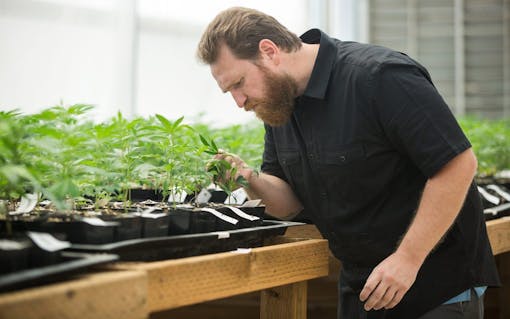
Roy Arms, CEO of Seven Hills and Boggy Boon, inspects his crop for spider mites and other pests. (Jordan Stead for Leafly)
This isn’t the end of legal cannabis in rural Washington. Even now, regulators and growers are scrambling to develop a compromise that keeps legal weed out of court, and even some local officials admit that cannabis is being unfairly singled out.
But the moratoriums have raised questions about the region’s ability to fully exploit its natural advantages and, one day perhaps, become a robust supplier for a national market. In the meantime, the case of cold feet sweeping through these rural counties has sent a chill through the ranks of growers, some of whom fear this could be the start of an anti-cannabis backlash in rural America. In Pueblo County, Colorado, cannabis growing is booming and farmers are prospering–but local prohibitionists have put an initiative on the November ballot that would kick the entire industry out of the county.
What remains unclear, says Timothy McCormack, a Seattle attorney who co-owns Antoine Creek Farms, one of Okanogan County’s biggest producers, is how politicians here and in other rural districts will react to that pushback.
“The question is,” says McCormack, “do the current powers-that-be really want to see marijuana cultivation continue?”

Sold in the City, Grown in the Country
Welcome to marijuana’s rural conundrum. Although the lion’s share of recreational cannabis is consumed in urban areas, more and more of that weed is being produced outside the city limits—often way outside. That’s not surprising. The legal market is merely discovering what the black market has known for decades: Sun-grown cannabis, in greenhouses or outdoors, can be produced far cheaper than energy-intensive indoor marijuana. By some estimates, outdoor farms operate up to 20 to 30 percent cheaper than indoor grows. That cost advantage is one reason that nationally, the share of the legal crop coming from outdoor grows alone has doubled from five percent in 2015 to at least ten percent this year, says Nic Easley, CEO of Denver-based 3C Consulting. In Washington state, closer to 15 percent of all cannabis is grown outside. Greenhouse farming is booming in Oregon, where more than 20 percent of the state’s crop comes out of the sheltered grows. And the outdoor/greenhouse share of the market will only keep rising, growers say, as consumers demand more “natural” product and an increasingly competitive, price-sensitive retail market pushes producers and processors toward lowest-cost methods.
Urbanites don't mind retail shops, but small-town America finds itself increasingly uncomfortable with cannabis farming.
Therein lies the rub. As cannabis farmers gravitate to the hinterlands, their success is being greeted with a decidedly mixed response from the locals. In Washington, Colorado, and Oregon, dozens of rural cities and counties have banned growing and selling in an effort to stop legalization at their boundaries. Today the legal geography of those states looks a lot like the booze maps of the post-Prohibition era, when one county was wet and the next one dry. More to the point, many of the rural communities that initially embraced legalization—typically with the hope of generating tax revenue—are coming under pressure to walk back that welcome wagon as locals see how marijuana farming actually looks—and smells.

Framed by discarded growing pots, a man exits one of the greenhouses of Seven Hills Farms. (Jordan Stead for Leafly)
“We’re seeing that happen everywhere,” says Easley. In some markets, like Colorado, he says, towns that “were going to allow everything are now going to allow only medical cultivation, and are banning all rec sales and all rec cultivation.” A similar pattern of rural approach-avoidance has emerged in Oregon, where a recently legalized recreational market is still in its first year, and in California, where voters are expected to legalize recreational cannabis in November.
Shop highly rated dispensaries near you
Showing you dispensaries nearThis rural backlash isn’t just a Western thing. As other states consider legalizing recreational marijuana—among them Arizona, Nevada, Maine, and Massachusetts—and as demand rises for outdoor and greenhouse cannabis, the rural friction we’re seeing out West might well become the norm. Urban dwellers may be comfortable with retail shops popping up around town, but small-town America finds itself increasingly uncomfortable with the production side of the industry.
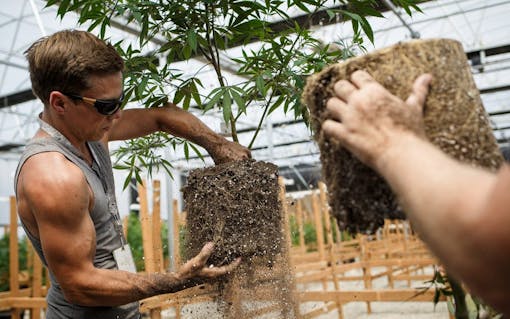
Head grower Nick Paton transplants cannabis crop. (Jordan Stead for Leafly)
A Lingering Anti-Cannabis Culture
You don’t have to spend too much time in Wenatchee and its neighboring Columbia River towns to understand the source of the cannabis backlash. These are agricultural communities. Wenatchee is the self-proclaimed “Apple Capital of the World.” Politics here traditionally tilt conservative, but conservative isn’t synonymous with “anti-cannabis.” Pro-business libertarians tend to embrace legalization as an expression of individual freedom. Other conservatives see it as a source of jobs and taxes for struggling towns.
But the region is also known for its social conservatism, particularly among older residents and farmers. They regarded marijuana legalization as a risky enterprise foisted upon rural eastern Washington by urban liberals west of the Cascade Mountains. Initiative 502, which legalized recreational marijuana, passed by an overwhelming 63.5 percent in Seattle-King County. But it barely squeaked by in Chelan County (51.8 percent) and Okanogan County (51.4 percent) and was narrowly rejected, by 51.1 percent, in Douglas County.
Some of that anti-marijuana attitude lingers. Even in rural jurisdictions where local majorities voted “yes,” skeptics regard recreational cannabis as a social burden borne by rural communities for the benefit of urban smokers and wealthy entrepreneurs. It isn’t lost on these skeptics that many of the farmers, like Roy Arms, are originally from the other side of the mountains. As Antoine Creek Farms’ McCormack puts it, with each new cannabis-related incident, local politicians “are getting pressure from some in the community who maybe weren’t on board to begin with.”
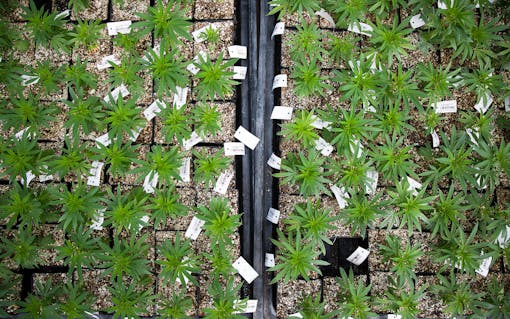
‘Someone Should Have Flown to Colorado’
There’s more to it than just warring ideologies. Rural governments are small. They have modest budgets and overworked staffs. A big city like Seattle can pull in experts from half a dozen departments to deal with recreational marijuana. A rural municipality, by contrast, might have a single employee charged with regulating a crop that was, until recently, criminalized. “Keep in mind that no one had a line for marijuana [in their zoning code]”, says Perry Houston, head planner in Okanogan County. When it came to legalization, many rural counties and cities were more or less winging it. That made mistakes all but inevitable.
Take the case of Douglas County, which sits across the Columbia River from Wenatchee. Although the county narrowly rejected Initiative 502, the measure had support in the county’s more urban areas, and county officials moved swiftly to add cannabis cultivation to existing farming activities. “We weren’t calling it ‘agriculture,’ but we believed it would have similar characteristics,” says Mark Kulaas. Kulaas is the head of planning for Douglas County, and in his spare time he sits on the Wenatchee City Council. “You know, you grow something, harvest it, package it, ship it and then it’s sold, which isn’t really that much different from what we do with tree fruit.”
Two years ago the county’s prompt action earned plaudits from officials around the state. At the annual meeting of the state association of counties, Douglas County was held up “as an example of how you can treat marijuana now that it is legal,” recalls County Commissioner Dale Snyder.
But the new zoning touched off a land rush by prospective cannabis farmers. During the first few weeks of legalization, Okanogan County averaged six permit applications for farm buildings every day. Nor could many small towns prepare for the clash between new state cannabis laws and existing local regulations. Some of the conflicts have been comical. Washington state requires eight-foot tall fences around cannabis farms. That’s fine—but many counties prohibit fences taller than six feet.
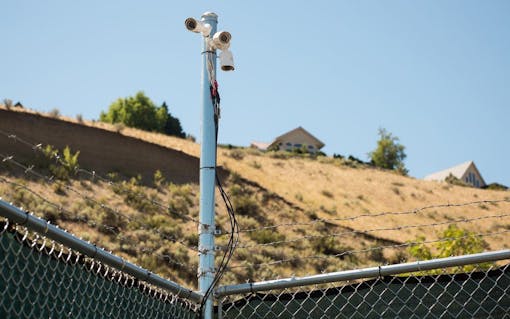
Security measures at Seven Hills Farms include hundreds of cameras and barbed wire fences (Jordan Stead for Leafly)
Other Conflicts Are More Substantial
County officials complain that Washington’s Liquor and Cannabis Board, or LCB, routinely approves farm licenses for grow operations that use buildings, equipment, or procedures that largely ignore local zoning. In one case, when a cannabis farmer was found to be burning his crop waste—in effect, smoking out his neighbors—state cannabis officials admitted to local deputies that they hadn’t actually inspected the farm in person, as required by state law, but instead had reviewed the facility via Google Earth. (A board spokesman says that all farms are inspected in person.)
Once the crops came in, so did complaints about the plant’s pungent fragrance. “You’ve got two to three weeks when you can’t even go outside,” Snyder says. Snyder and his fellow commissioners realized their well-intended regulations had serious gaps. Among them: zoning that allowed cannabis farms next to existing homes or businesses. For Snyder, the takeaway is clear. “I wish we had taken a little more time and let someone else be the pioneer.”
“It became fairly apparent that the (state) board didn’t have a great handle on this.”
Certainly, gaffes like these could have been avoided. Small towns and counties in Washington, for example, would have benefited by studying the experiences of their counterparts in Colorado, where medical cannabis farms had been legalized and state-regulated for years. “Somebody should have gotten on a plane and flown to Colorado and done some research,” says Douglas County’s Kulass. He strongly suggests a similar sort of research trip for small-town officials in other states considering legalization.
“The spin was that this was going to be tightly regulated and everyone would toe the line,” says Okanogan County’s Houston. But “it became fairly apparent to us that the [state] board didn’t have a great handle on this.” That realization, Houston says, was a big factor in the county’s decision to halt new farms and “tighten the rules.”
To be sure, there have been bureaucratic missteps. But growers themselves aren’t entirely blameless. Legalization has brought professionalization to cannabis farming, but the rollout has also included producers who cut corners. In the months before Washington’s recreational market opened, according to local law enforcement, a number of prospective producers got a head start on supply by planting unusually large “personal” crops under their medical marijuana licenses. Others have tried to run extraction operations using sub-standard equipment, which in several cases led to fires—and more bad feelings among locals.
Farmers themselves recognize the problem. “There are a lot of people in the industry who are unsavory,” acknowledges McCormack, with Antoine Creek Farms. When those bad apples “start pissing off their neighbors and not cooperating with the police, and trying to build their structures on the down low,” he says, it helps pump up local anti-cannabis sentiment. In such an environment, McCormack says, “all it takes is somebody with an odor complaint.”
In fact, growers such as Arms worry that, as other fears about recreational cannabis (such as crime spikes) aren’t borne out, opponents may seize on issues like odor to justify their position that local governments “shouldn’t allow it.”

Roy Arms, CEO of Seven Hills and Boggy Boon, tend stop his crops within one of his greenhouse grow operations. (Jordan Stead for Leafly)
Solving Problems, One by One
Is there any way out of the conflict? Possibly. There are signs that farmers are finding ways to work with their neighbors and local officials to quell the rural backlash. After Chelan County growers threatened litigation over the ban on new producers, for example, the county assembled a working group of residents, growers, and other stakeholders to explore possible compromises. In July, the group proposed several regulations to help manage issues such as odor, which participants are cautiously optimistic can be implemented by year’s end. Even before the working group has issued its findings, individual farmers had been working with unhappy residents to come up with solutions that don’t involve legal briefs and with billable hours.
Farmer Roy Arms has met with neighbors to address their concerns. When one neighbor complained about the greenhouse lights at night, Arms agreed to put on blackout covers earlier in the evening. Arms has also asked neighbors to give him time to see if he can come up with a solution to the odor problem.
In the long run, cannabis’s rural problem is probably best understood less as a terminal disease than an awkward adolescence—one that may ultimately be resolved by the passage of time and the good will of farmers and their neighbors. Certainly, local governments are going to become more sophisticated about regulating the industry and preparing for potential negative impacts. At the state level, meanwhile, legislators in Washington, Colorado, Oregon, and Alaska are tweaking recreational and medical cannabis laws to make life easier for local jurisdictions—improvements that other states considering legalization will likely incorporate from the start.
Rural communities themselves are likely to grow into a greater degree of acceptance. Small-town America has always been suspicious of new arrivals – as, for example, when out-of-town developers propose new subdivisions or resorts. With the marijuana debate, says Okanogan’s Houston, “you’re hearing the exact same discussion — ‘Outside money is coming in and goring the local fabric of our culture.’” In time, those suspicions often fade, especially when the changes come with economic benefits. Even the skunkish smell might eventually come to be seen as a sign of a vital industry, much like the aroma of the manure farmers now spray on orchards and fields.

The greenhouses of Seven Hills Farms in Malaga, WA. (Jordan Stead for Leafly)
This isn’t to suggest a rural future of total cannabis tolerance. Just as many residents in central Washington will never embrace legal cannabis or its side effects, rural America as a whole will remain divided over the issue. Some towns and counties may never relent. Decades from now, America’s cannabis map will still be a patchwork of “yes” and “no” states, counties, and cities. But in places where legal cannabis production has a toehold today, however tenuous, economic trends may ultimately overcome social resistance.
And those economic trends are powerful. It’s already clear that that sun-grown cannabis will claim an ever-greater share of the market. Consumer interest in “natural” product, raised with fewer chemicals and a smaller-carbon footprint, will drive demand for the outdoor crop. Rural growers also stand to benefit from an evolving retail product mix, particularly the growing popularity of dabs, oils, and other concentrates. Because these products require large volumes of bulk cannabis, demand will rise for the lowest-cost raw material—and the large-scale outdoor and greenhouse operations that can supply it.
All these market trends will make rural cultivation steadily more attractive. That will be true for outside veteran operators and investors from the big urban centers, but also for current rural residents looking for alternatives to farming more conventional crops. As Easley puts it, “If I’m a local farmer making $170 an acre with corn and suddenly, I have an opportunity to make a couple million off that same acre cultivating cannabis, what do you think I’m going to do?”
